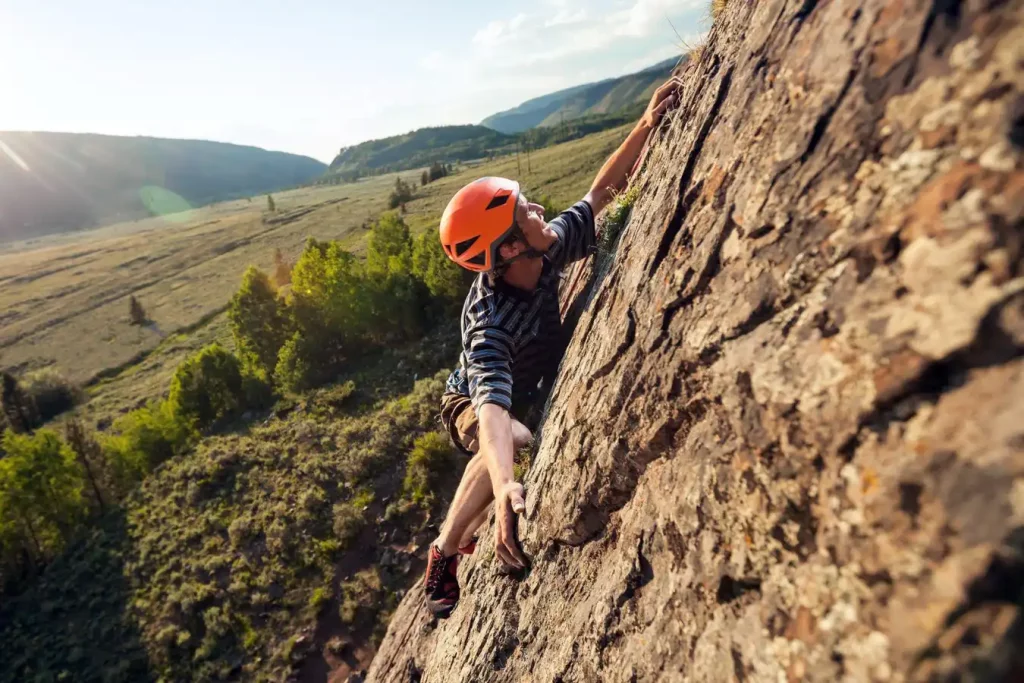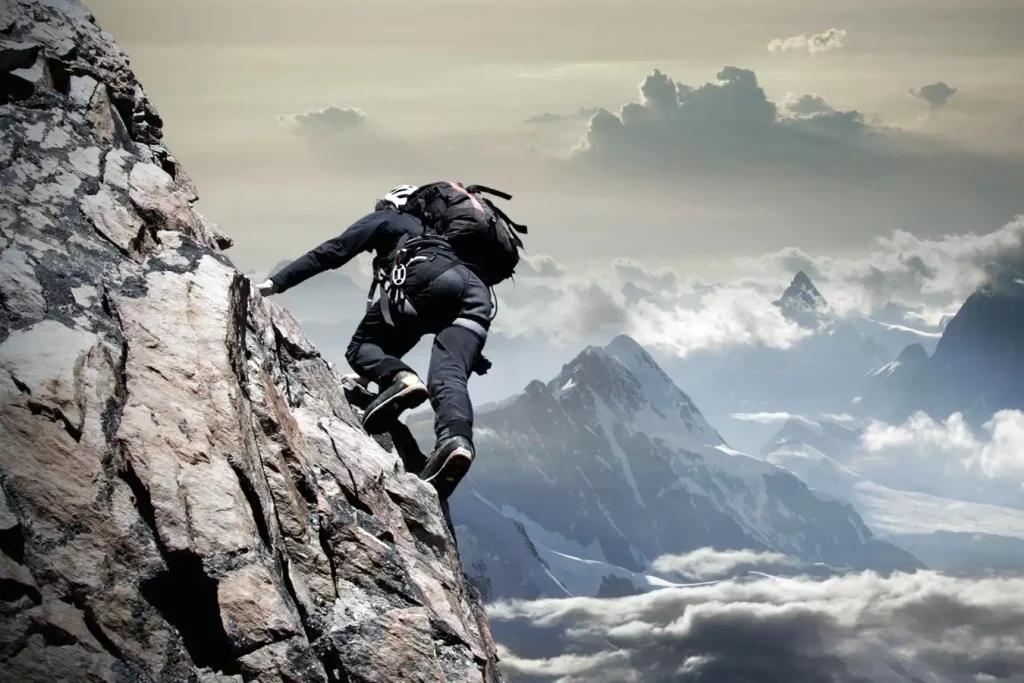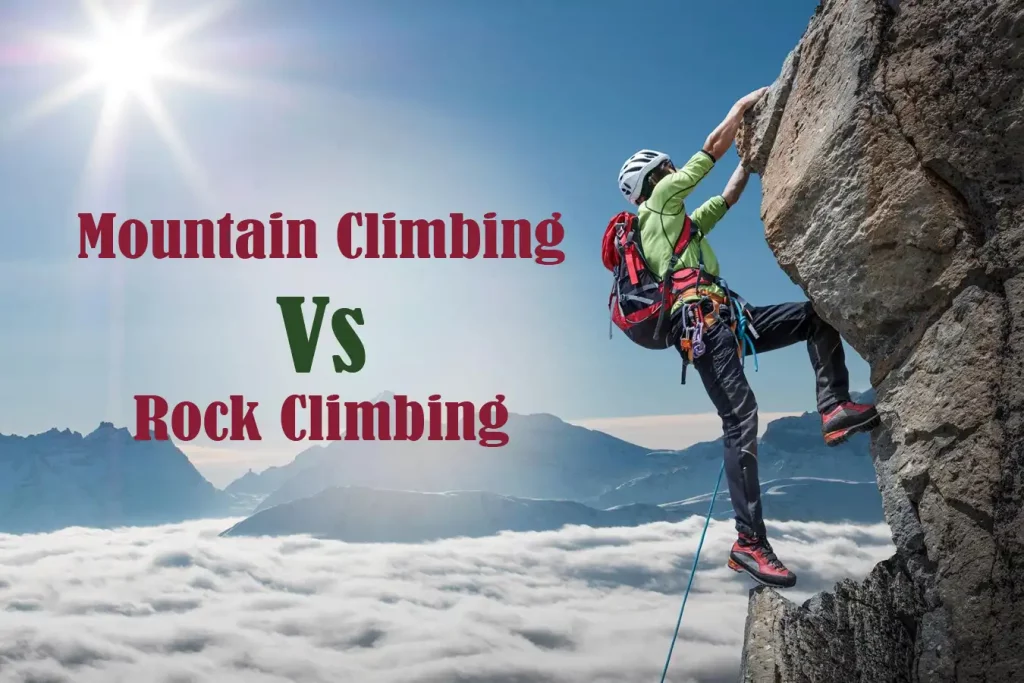Embarking on the journey of mountain climbing vs rock climbing can spark a world of adventure and challenge.
As an avid outdoor enthusiast, eager to shed light on this exhilarating debate.
Through this article, we'll navigate the nuances, risks, and rewards of these thrilling activities.
Are you ready to ascend to new heights of knowledge and perhaps even passion?
Expect to emerge with a clearer understanding, ready to make your choice between mountain climbing and rock climbing.
Get set, strap in, and prepare for an enlightening climb into the heart of the great outdoors!
Understanding Rock Climbing
Rock climbing is a physically and mentally demanding sport that involves ascending steep rock formations or artificial rock walls, using one's strength, endurance, agility, and balance, often secured with safety equipment to prevent falls. It's an adventure that combines physical strength, mental resilience, and a spirit of exploration.

Brief History of Rock Climbing
The story of rock climbing begins in the 19th century as a component of mountaineering. Mountaineers started climbing rocks to prepare themselves for higher peaks. It was Walter Parry Haskett Smith, often deemed the ‘Father of Rock Climbing,' who scaled Napes Needle in England in 1886, propelling rock climbing into a standalone sport. Today, it's more than a sport – it's a lifestyle!
Types of Rock Climbing
When we delve into the world of rock climbing, it’s diverse. Here are the primary types:
- Bouldering: An exciting form that involves climbing small rock formations or boulders without the use of ropes or harnesses. Crash pads and human spotters help minimize the risk.
- Top-Roping: This is ideal for beginners. The climber is always attached to a rope, offering maximum safety as the rope runs through an anchor system at the top.
- Lead Climbing: A step up in the thrill department, lead climbing involves a climber attaching themselves to a length of dynamic (stretchy) rope and clipping into protection as they ascend the route.
Essential Equipment for Rock Climbing
When it comes to rock climbing, gear can be your best friend. Your basic kit should include a helmet (non-negotiable!), climbing shoes for a firm grip, a harness, ropes, carabiners, and belay devices. For bouldering, don't forget your crash pad!
Safety Measures and Skills Required in Rock Climbing
Rock climbing might appear risky, but with the right safety measures, it’s as safe as any sport. Always check your gear, follow climbing protocols, and never climb alone. As for skills, you need strength, agility, endurance, and a good understanding of climbing techniques. But, remember, the most crucial skill is mental – the ability to stay calm, focused, and maintain a problem-solving attitude when faced with challenges on the rock face.
Understanding Mountain Climbing
Mountain climbing, also known as mountaineering, is the sport of hiking, skiing, and climbing to the summit of mountains, often involving technical equipment and skills to navigate diverse terrains, high altitudes, and challenging weather conditions.

Brief History of Mountain Climbing
Mountain climbing, also known as mountaineering, can trace its roots back to the prehistoric times when our ancestors had to scale heights for survival. The modern history of mountain climbing began in the early 19th century. The ascent of Mont Blanc by Jacques Balmat and Dr. Michel Paccard in 1786 is often considered the birth of recreational mountaineering.
Over time, mountain climbing evolved from an adventurous pastime to a well-structured sport with a defined set of rules, techniques, and equipment.
Types of Mountain Climbing
Mountain climbing isn't just about scaling Everest. There are different types that cater to various skill levels and physical abilities:
- Hiking: An accessible form of mountain climbing, hiking involves walking on well-marked trails and man-made paths. It's the ideal type for beginners or those who prefer less technical climbing.
- Alpine Mountaineering: This type involves scaling high mountains in typically snowy and icy conditions, often necessitating the use of specific equipment like crampons and ice axes.
- High-Altitude Mountaineering: This is the apex of mountain climbing, involving ascents of peaks above 8,000 meters (26,000 ft) like the famed Himalayan giants. High-altitude mountaineering is challenging, requiring extensive preparation, equipment, and physical conditioning.
Essential Equipment for Mountain Climbing
Mountain climbing demands the right gear. The essential kit generally includes a helmet, mountaineering boots, ropes, carabiners, harnesses, ice axes, and crampons for icy terrains. Moreover, the nature of mountain climbing often demands additional equipment like tents, cooking gear, and navigation tools for multi-day trips.
Safety Measures and Skills Required in Mountain Climbing
Mountain climbing can pose various risks, but proper preparation can significantly mitigate them. Routinely inspect your equipment, check weather reports, and don't overlook the buddy system. In terms of skills, besides physical fitness, you need knowledge of climbing techniques, route navigation, and a robust understanding of first aid and survival skills. Moreover, similar to rock climbing, the mental grit to overcome challenges is a significant part of mountain climbing.
Mountain climbing and rock climbing, while similar, offer unique experiences and cater to different types of thrill-seekers. Understanding these nuances will not only enhance your climbing journey but also help you make an informed decision about which one suits your adventurous spirit better.
Mountain Climbing vs Rock Climbing: A Comparative Analysis
Having explored the landscapes of rock climbing and mountain climbing, let's delve into a comparative analysis. Despite sharing the core essence of ascending heights, they differ remarkably in purpose, skills required, equipment, training, and safety considerations.
Differences in Purpose and Goals
Mountain climbing, typically, is an endurance activity aimed at reaching the top of mountain peaks. It involves longer durations, possibly extending to days or even weeks. On the other hand, rock climbing focuses more on short, intense bursts of climbing with the goal of completing a specific route, often without the emphasis on reaching the top of a mountain.
Differences in Physical Demand and Skills
While both demand a high level of physical fitness, the emphasis varies. Rock climbing requires strength, agility, and flexibility, with a focus on upper body strength and grip. It also calls for advanced techniques for navigating vertical faces and overhangs.
Mountain climbing, in contrast, is a test of endurance, cardiovascular fitness, and resilience. Navigating rough terrains, adjusting to altitude changes, and weathering harsh elements are crucial aspects of mountain climbing.
Differences in Equipment
There's a considerable overlap in equipment such as ropes, harnesses, and helmets. However, rock climbing often uses specific gear like belay devices, chalk for grip, and specialized shoes.
Mountain climbing, especially in icy conditions, demands equipment like crampons, ice axes, and mountaineering boots. Moreover, due to its longer duration, it also requires camping equipment and survival gear.
Differences in Training and Preparation
Training for rock climbing centers around improving strength, flexibility, and climbing techniques. Indoor climbing gyms are excellent training grounds.
For mountain climbing, the focus is on building endurance, acclimatization to high altitudes, and survival skills. Long-duration hiking and backpacking trips are typical preparation methods.
Differences in Risk and Safety Considerations
Both activities come with their share of risks, but they differ in nature. Rock climbing risks include falls, equipment failure, and rockfall. Safety protocols emphasize proper belay techniques, regular equipment checks, and protective measures against rockfall.
Mountain climbing risks encompass weather changes, avalanches, and altitude sickness. Safety considerations include weather forecasting, avalanche awareness, and gradual acclimatization.
In essence, while both rock climbing and mountain climbing share the joy of ascension, they offer distinct challenges and rewards. Your preference would depend on your physical aptitude, preparation level, and what you seek from the adventure. Whether it's the technical demand of rock faces or the enduring quest for mountain summits, the choice is yours to make. After all, the mountains and rocks are calling, and you must go!
To know more: Backpacking Vs Hiking
How to Choose Between Rock Climbing and Mountain Climbing
So, you've read through the nuances of rock climbing and mountain climbing, and you're still on the fence about which one to pursue. That's okay; choosing an adventurous outdoor pursuit is a big decision. Let's walk through some factors you might consider to make your choice.
Assessing Your Physical Fitness and Skills
Start with a frank self-assessment. If you're someone with strong upper body strength, and you thrive in situations that require power and agility, rock climbing might be up your alley.
On the other hand, if you're more of an endurance athlete, accustomed to long-duration activities like marathon running or long-distance cycling, mountain climbing may be more appealing. Remember, it's not about which is better, but rather which suits you better.
Considering Your Goals and Preferences
What do you hope to achieve? If you're seeking the thrill of conquering challenging routes and testing your strength against gravity, rock climbing is an exciting choice.
If you dream of summiting iconic peaks, experiencing diverse ecosystems, and embracing the challenges of multi-day adventures, mountain climbing is likely your cup of tea. Your preferences and goals are significant determinants of your choice.
Evaluating Your Risk Tolerance
Lastly, consider the risks involved. Rock climbing has its perils, such as falls and equipment failure. Mountain climbing has a different set of hazards, including altitude sickness, avalanches, and extreme weather. Ensure you're comfortable with the associated risks of your chosen activity.
FAQs about Mountain Climbing Vs Rock Climbing
Is there a difference between rock climbing and mountain climbing?
What is considered mountain climbing?
Can you climb mountains without rock climbing?
Is hiking considered mountain climbing?
What are people who climb mountains called?
Why is mountain climbing so hard?
Final Words
Mountain climbing and rock climbing, while seemingly similar, are unique pursuits with their distinct demands and delights. Your choice between the two should reflect your physical fitness, personal goals, and risk tolerance.
But remember, whether you choose to ascend vertical rock faces or push towards high-altitude peaks, the joy lies in the journey, not the destination. Whichever path you choose, embrace the process, and keep safety at the forefront. The mountains and rocks are not going anywhere; they will wait for you to be ready.
As we conclude this journey, remember, adventure is personal. It's about pushing your boundaries, experiencing the wonders of nature, and, most importantly, having fun. So, will it be rock climbing or mountain climbing? Or perhaps both? The choice is yours, and the adventure awaits!


